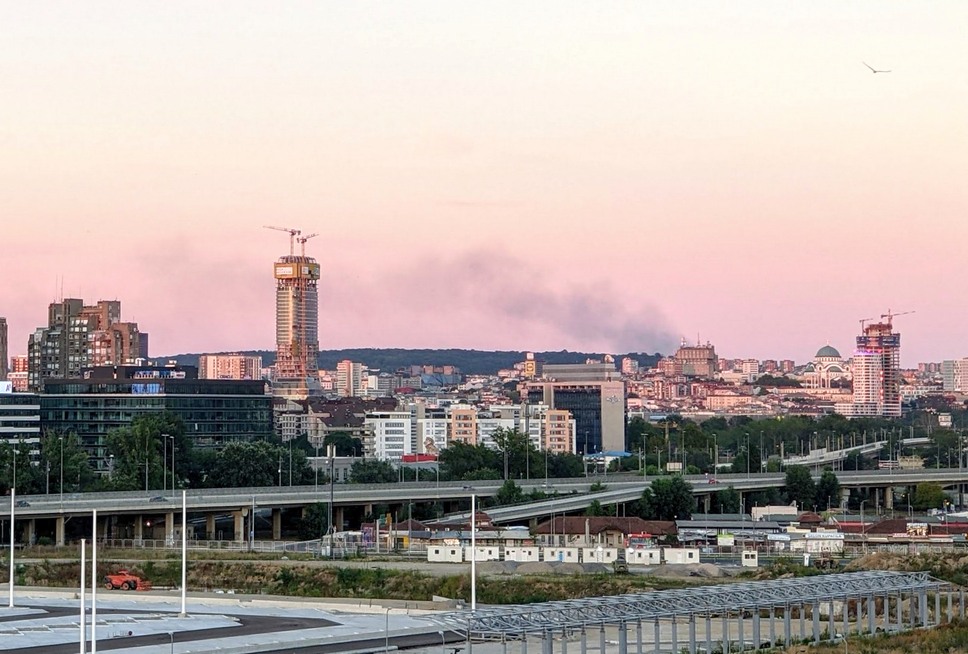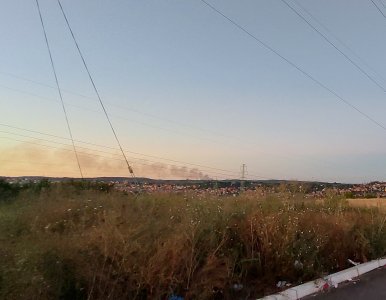Koristite zastareli preglednik. Možda se neće pravilno prikazivati ova ili druge veb stranice.
Trebalo bi da nadogradite ili koristite alternativni preglednik.
Trebalo bi da nadogradite ili koristite alternativni preglednik.
Ekologija ...vazduh,voda,buka,zelenilo,...
- Začetnik teme dragan
- Datum pokretanja
MC_
Professional
- Učlanjen(a)
- 14.11.2017.
- Poruke
- 11.791
- Pohvaljen
- 12.086
Mnogi ljudi smatraju da je sve u savrsenom redu. Ovo je svkako najbolji svet od svih mogucih. Progres je super. Kapitalizam je cool.
Ispijajte kapucina.
Ipak, postoji nauka, ne ona hipotetika, ideoloska, vec ona klasicna, koja analizira i broji i meri. recimo broj insekata u nekoj zapremini.
Ispostavlja se da je bioamsa insekata pala za 75% u zadnjih 27 godina U Nemackoj. Biomasa (masa ulovljenih insekata u nekoj zapremini) je pala u svim ekoloskim nisama. Pad broja insekata indikator je bolesti ekosistema.
Ne znamo da li je zbog zagadjenja, elektromagnetnog zracenje ili je nesto drugo.
Znamo da smo to mi, ljudi. Vrsta koja je unistila planetu.
https://journals.plos.org/plosone/artic ... ne.0185809
Global declines in insects have sparked wide interest among scientists, politicians, and the general public. Loss of insect diversity and abundance is expected to provoke cascading effects on food webs and to jeopardize ecosystem services. Our understanding of the extent and underlying causes of this decline is based on the abundance of single species or taxonomic groups only, rather than changes in insect biomass which is more relevant for ecological functioning. Here, we used a standardized protocol to measure total insect biomass using Malaise traps, deployed over 27 years in 63 nature protection areas in Germany (96 unique location-year combinations) to infer on the status and trend of local entomofauna. Our analysis estimates a seasonal decline of 76%, and mid-summer decline of 82% in flying insect biomass over the 27 years of study. We show that this decline is apparent regardless of habitat type, while changes in weather, land use, and habitat characteristics cannot explain this overall decline. This yet unrecognized loss of insect biomass must be taken into account in evaluating declines in abundance of species depending on insects as a food source, and ecosystem functioning in the European landscape.
Ispijajte kapucina.
Ipak, postoji nauka, ne ona hipotetika, ideoloska, vec ona klasicna, koja analizira i broji i meri. recimo broj insekata u nekoj zapremini.
Ispostavlja se da je bioamsa insekata pala za 75% u zadnjih 27 godina U Nemackoj. Biomasa (masa ulovljenih insekata u nekoj zapremini) je pala u svim ekoloskim nisama. Pad broja insekata indikator je bolesti ekosistema.
Ne znamo da li je zbog zagadjenja, elektromagnetnog zracenje ili je nesto drugo.
Znamo da smo to mi, ljudi. Vrsta koja je unistila planetu.
https://journals.plos.org/plosone/artic ... ne.0185809
Global declines in insects have sparked wide interest among scientists, politicians, and the general public. Loss of insect diversity and abundance is expected to provoke cascading effects on food webs and to jeopardize ecosystem services. Our understanding of the extent and underlying causes of this decline is based on the abundance of single species or taxonomic groups only, rather than changes in insect biomass which is more relevant for ecological functioning. Here, we used a standardized protocol to measure total insect biomass using Malaise traps, deployed over 27 years in 63 nature protection areas in Germany (96 unique location-year combinations) to infer on the status and trend of local entomofauna. Our analysis estimates a seasonal decline of 76%, and mid-summer decline of 82% in flying insect biomass over the 27 years of study. We show that this decline is apparent regardless of habitat type, while changes in weather, land use, and habitat characteristics cannot explain this overall decline. This yet unrecognized loss of insect biomass must be taken into account in evaluating declines in abundance of species depending on insects as a food source, and ecosystem functioning in the European landscape.
Zuma
Professional
- Učlanjen(a)
- 19.05.2009.
- Poruke
- 12.705
- Pohvaljen
- 28.788
Vest od potencijalno ogromnog i civilizacijskog značaja.
Ako sve bude išlo po planu Kina je spremna da već početkom septembra pusti u rad prvi u svetu Torijumski nuklearni reaktor punih dimenzija i pridruženu električnu centralu od 2 MW. Ovakvi reaktori imaju niz eksploatacionih i sigurnosnih karakteristika koje ih čine prvim sigurnim i komercijalno upotrebljivim čistim izvorom energije koji nije promenljiv u vremenu i ima neograničeni kapacitet. Ne zagađuju, mogu biti toliko mali da se stave u avion, od njih se ne može napraviti oružije, torijuma ima bitno više od urana, itd. Ako to uspe bukvalno bi se mogla završiti faza prljave energije, fosilnih goriva i "nužnog" zagađenja.
"In 2011, Beijing approved the construction of the prototype Thorium Molten Salt Reactor (TMSR), in Wuwei, a desert city in Gansu province. Meanwhile, teams of researchers from across the country were mobilised to solve the technical problems revealed by the earlier experiments. These included development of an alloy that can withstand the radiation from thorium salt at temperatures of nearly 1,000 degrees Celsius. Although the project fell behind schedule, in part due to the pandemic, construction work on the TMSR is due to finish next month and a test run of equipment could start in September.
Although the prototype is only capable of generating 2MW, if it succeeds it will be the first time theory has been put into practice."
https://www.neimagazine.com/news/newsch ... or-8919220
China Is Building a Thorium Molten Salt Reactor - Here's Why It Matters
[youtube]https://www.youtube.com/watch?v=1EFfxMx6WJs[/youtube]
Ako sve bude išlo po planu Kina je spremna da već početkom septembra pusti u rad prvi u svetu Torijumski nuklearni reaktor punih dimenzija i pridruženu električnu centralu od 2 MW. Ovakvi reaktori imaju niz eksploatacionih i sigurnosnih karakteristika koje ih čine prvim sigurnim i komercijalno upotrebljivim čistim izvorom energije koji nije promenljiv u vremenu i ima neograničeni kapacitet. Ne zagađuju, mogu biti toliko mali da se stave u avion, od njih se ne može napraviti oružije, torijuma ima bitno više od urana, itd. Ako to uspe bukvalno bi se mogla završiti faza prljave energije, fosilnih goriva i "nužnog" zagađenja.
"In 2011, Beijing approved the construction of the prototype Thorium Molten Salt Reactor (TMSR), in Wuwei, a desert city in Gansu province. Meanwhile, teams of researchers from across the country were mobilised to solve the technical problems revealed by the earlier experiments. These included development of an alloy that can withstand the radiation from thorium salt at temperatures of nearly 1,000 degrees Celsius. Although the project fell behind schedule, in part due to the pandemic, construction work on the TMSR is due to finish next month and a test run of equipment could start in September.
Although the prototype is only capable of generating 2MW, if it succeeds it will be the first time theory has been put into practice."
https://www.neimagazine.com/news/newsch ... or-8919220
China Is Building a Thorium Molten Salt Reactor - Here's Why It Matters
[youtube]https://www.youtube.com/watch?v=1EFfxMx6WJs[/youtube]
astrodule
Professional
Toplo vreme, nema individualnih ložišta, ali imamo PM zagađenje. Divno vreme da se izdvoji direktan krivac za to.
TE NIKOLA TESLA
Možemo videti očigledno poklapanje zagađenja SO2, PM2.5 i PM10 (ovaj PM10 na jugu je pesak iz Afrike koji na sreću neće doći do Beograda po trenutnoj prognozi)



TE NIKOLA TESLA
Možemo videti očigledno poklapanje zagađenja SO2, PM2.5 i PM10 (ovaj PM10 na jugu je pesak iz Afrike koji na sreću neće doći do Beograda po trenutnoj prognozi)
boca-ica
Professional
- Učlanjen(a)
- 02.04.2010.
- Poruke
- 11.190
- Pohvaljen
- 5.615
I ja čuo naročito i za Frušku goru od ,,prve ruke ,, -kamiondjije koj je iz šume terao posečema debla.... i da prepolovimo količinu o kojoj mi je prčao...Cuo sam glasine o tekucij intenzivnoj seci domacih suma (na Kopaoniku) i drugim nac. parkovima...
što je mnogo ,mnogo je to
cena gradje svuda u Evropi je skočila -poskupela zbog covida, pa i kod nas
Duplirana zarada je ne odoljiva za mafijaše i nj. spregu -provozijaše
:twisted:
astrodule
Professional
Gledajući ovu mapu poslednjih nedelja, vidim da se SO2 širi samo iz Obrenovca, a oko Smedereva i Bora nema skoro nikakvog zagađenja.
https://www.ventusky.com/?p=44.45;20.93;8&l=so2
Da li to znači da ovih dana Smederevo i Bor slabije rade ili da oni imaju neke filtere?
https://www.ventusky.com/?p=44.45;20.93;8&l=so2
Da li to znači da ovih dana Smederevo i Bor slabije rade ili da oni imaju neke filtere?
Jeste Vinča i jeste deponija. Vest kao da je svakodnevnica neka i kao da je to normalno....
https://www.blic.rs/vesti/beograd/velik ... to/7xjhbms
https://www.blic.rs/vesti/beograd/velik ... to/7xjhbms
astrodule
Professional
Video sam i ja juče dim sa Ade. Baš sam se pitao da li je dim ili oblaci.
Ali, da li je moguće, da u 2021. godini, kada skoro svako ko želi ima dron, nema nijednog jedinog snimka ovakvih katastrofa. Pored toliko "opozicije", NVO, zelenih pokreta, baš niko ne može da digne dron i snimi pravi izvor ovog trovanja!?
Ali, da li je moguće, da u 2021. godini, kada skoro svako ko želi ima dron, nema nijednog jedinog snimka ovakvih katastrofa. Pored toliko "opozicije", NVO, zelenih pokreta, baš niko ne može da digne dron i snimi pravi izvor ovog trovanja!?
Дошљак
Professional
- Učlanjen(a)
- 31.10.2014.
- Poruke
- 38.903
- Pohvaljen
- 69.180
Eво снимак са саме депоније. https://www.facebook.com/Goran.Vesic.zv ... 0467739931
astrodule
Professional
Užaš. Kod mene (Fontana) se oseća i vidi taj smrad.
Pohvalno je što je upravo Vesić okačio ovaj snimak. Doduše, ovo se ne može sakriti, ali viđamo napredak u odnosu sa javnošću!
Pohvalno je što je upravo Vesić okačio ovaj snimak. Doduše, ovo se ne može sakriti, ali viđamo napredak u odnosu sa javnošću!
astrodule
Professional
Ja sam mislio da je postojeća deponija već zatrpana i "vakumirana".
Za čudo, kod mene se ništa nije osetilo.[url=http://beobuild.rs/forum/viewtopic.php?p=870159#p870159:f5izsxnd je napisao(la):astrodule » 08 Avg 2021 11:53[/url]":f5izsxnd]Užaš. Kod mene (Fontana) se oseća i vidi taj smrad.
molder
Higher intermediate
- Učlanjen(a)
- 30.11.2007.
- Poruke
- 1.391
- Pohvaljen
- 4.348
Ponekad se zapitam kako bi tek ziveli i sta bi se desavalo da nase "bajne"sluzbe ne reaguju pravovremeno i efikasno kao sto je to do sada slucaj u svakom incidentu. Mi u stvari sa svakim sledecim akcidentom vidimo koliko je gradska vlast efikasna
astrodule
Professional
Verujte VeUpravi, a ne svojim očima.
dr strangelove
Higher intermediate
- Učlanjen(a)
- 24.03.2008.
- Poruke
- 1.656
- Pohvaljen
- 10.556
[url=http://beobuild.rs/forum/viewtopic.php?p=870183#p870183:7shajxx3 je napisao(la):marrecar » 08 Aug 2021, 13:15[/url]":7shajxx3]Blic piše da je Vesić izjavio da je požar nastao oko 20:30. Ja sam onu sliku gore napravio u 20:11, a videlo se i ranije. Uzimajući u obzir da je dim već tada bio visok i daleko otišao, požar je nastao pre 20h.
juce u 19:51:

Preporučite:



